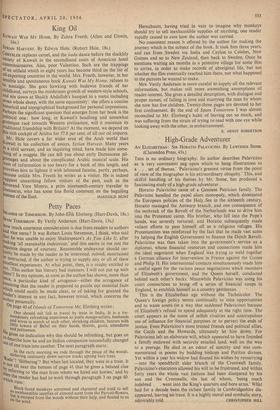High-Grade Adventurer
THIS is no ordinary biography. Its author describes Palavicino as 'a very convenient peg upon which to hang illustrations to a . . . set of themes.' Palavicino's greatest virtue from the point of view of the biographer is his extraordinary ubiquity.' This, and skilful handling of his themes by Mr. Stone, has produced a fascinating study of a high-grade adventurer .
Horatio Palavicino came of a Genoese Patrician family. The Palavicini handled the papal alum monopoly, which dominated the European policies of the Holy See in the sixteenth century. Horatio managed the Antwerp branch, and one consequence of the outbreak of the Revolt of the Netherlands was to drive him into the Protestant camp. His brother, who fell into the Pope's hands, was severely tortured; and Horatio subsequently made valiant efforts to pass himself off as a religious refugee. His Protestantism was reinforced by the fact that he made vast sums by helping the English Government to finance the Dutch Revolt. Palavicino was then taken into the government's service as a diplomat, whose financial resources and connections made him the ideal negotiator when England was trying to weld together a German alliance for intervention in France against the Guises and Philip II. His international contacts simultaneously made him a useful agent for the various peace negotiations which members of Elizabeth's government, and the Queen herself, conducted behind each other's backs. Meanwhile Palavicino was using his court connections to bring off a series of financial coups in
England, to establish himself as a country gentleman. • This is the Elizabethan age without the Technicolor. The Queen's foreign policy seems continually to miss opportunities and to waste assets (in a way that saddened Palavicino) because of Elizabeth's refusal to spend adequately at the right time. The court appears as the scene of selfish rivalries and unscrupulous use of influence for financial purposes or to pervert the ends of justice. Even Palavicino's most trusted friends and political allies, the Cecils and the Howards, ultimately let him down. For Palavicino left an elaborate will, which appeared to have founded a family endowed with securely entailed land, well on the way to a peerage. He died. in an odour of sanctity and was com- memorated in poems by budding bishops and Puritan divines. Yet within a year his widow had flouted his wishes by remarrying —into the spendthrift elder branch of the Cromwell family. Palavicino's executors allowed his will to be frustrated, and within forty years the whole vast fortune had been dissipated by his son and the Cromwells, the last of whom, 'being much indebted . . went into the King's quarters and bore arms.' Whitt had for a decade been the richest family in Cambridgeshire dis- appeared, leaving no trace. It is a highly moral and symbolic story,


















































 Previous page
Previous page